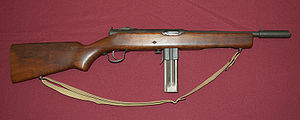M50 Reising
| Model 50 Reising | |
|---|---|

The Reising Model 50 submachine gun
|
|
| Type | Submachine gun |
| Place of origin | United States |
| Service history | |
| In service | 1941–1953 |
| Used by | See Users |
| Wars |
World War II Hukbalahap Rebellion Malaysian Emergency Costa Rican Civil War |
| Production history | |
| Designer | Eugene Reising |
| Designed | 1940 |
| Manufacturer | Harrington & Richardson |
| Produced | 1941–1945 |
| Variants | M55, M60, M65 |
| Specifications | |
| Weight | 3.1 kg (6.83 lb) (M50) 2.8 kg (6.2 lb) (M55) |
| Length | 959 mm (37.8 in) 787 mm (31.0 in) stock retracted (M55) |
| Barrel length | 279 mm (11.0 in) (M50) |
|
|
|
| Cartridge |
.45 ACP (M50 and M55) .45 ACP (M60) .22 LR (M65) |
| Action | Delayed blowback, closed bolt |
| Rate of fire | 550 rounds/min (M50) 500 rounds/min (M55) |
| Muzzle velocity | 280 m/s (919 ft/s) |
| Maximum firing range | 300 yards |
| Feed system | 12- or 20-round detachable box magazine |
| Sights | Front blade, rear notch |
The .45 Reising submachine gun was manufactured by Harrington & Richardson (H&R) Arms Company in Worcester, Massachusetts, and was designed and patented by Eugene Reising in 1940. The three versions of the weapon were the Model 50, the folding stock Model 55, and the semiautomatic Model 60 rifle. Over 100,000 Reisings were ordered during World War II, and were initially used by the United States Navy, Marine Corps, and the United States Coast Guard, though some were shipped to Canadian, Soviet, and other allied forces to fight the Axis powers.
The Reising submachine gun was a very innovative weapon for its time featuring firepower, accuracy, excellent balance, light weight and ease of manufacture compared to the Thompson Model 1928 submachine gun, the leading American competitor of the time. But poor combat performance and favorable law enforcement use of the Thompson forever mired the weapon in controversy.
Eugene Reising was an excellent marksman and ordnance engineer who believed engineering principles must match actual field needs. Reising practiced his creed by being an avid shooter and by serving in the early 1900s as an assistant to the firearm inventor, John M. Browning. In doing so, Reising contributed to the final design of the US .45 Colt M1911 pistol, one of the most reliable pistols in history. Reising then designed a number of commercial rifles and pistols on his own, when in 1938, he turned his attention to designing a submachine gun as threats of war rapidly grew in Europe.
Two years later he submitted his completed design to the Harrington & Richardson Arms Company (H&R) in Worcester, Massachusetts. It was accepted, and in March 1941, H&R started manufacturing the Model 50 full stocked submachine gun. Months later, production began on the Model 55 (identical to the Model 50 other than having a folding wire buttstock, no compensator, and a barrel half an inch shorter); and the Model 60 full stocked semiautomatic rifle that also resembled a Model 50, but had a 7.75 inch longer barrel without cooling fins or compensator.
...
Wikipedia
